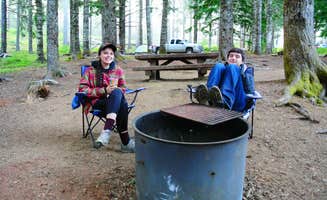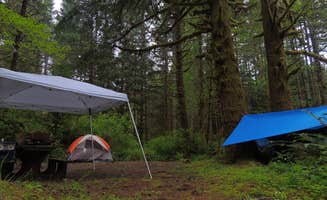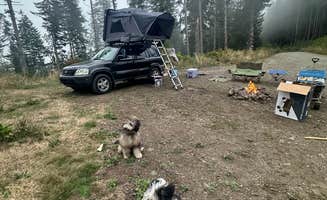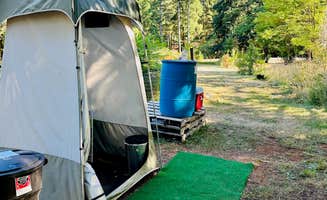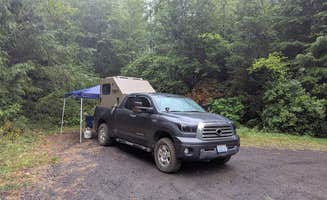Tent camping near Philomath, Oregon ranges from primitive sites in densely forested valleys to spots at elevations approaching 4,000 feet. The area's mixed coniferous forest includes Douglas fir, western hemlock, and western red cedar, creating a multi-layered canopy over most camping areas. Temperature differentials between valley floors and mountain sites can exceed 15 degrees during summer months.
What to do
Hike to waterfalls: Green Peak Falls offers a moderately challenging 2-mile trek from Alsea Falls Recreation Site, passing through McBee Park campground. One visitor noted, "If you venture further about 2 moderate miles, you find Green Peak falls which for my money is a way better experience. Well worth the extra time and effort."
Wildlife observation: Beaver Creek area provides excellent wildlife viewing opportunities just 15 minutes from Highway 101. At Forest Road 51 near Beaver Creek, a camper reported, "I did see about 5 beavers close to the road though, so that was sweet." The area features intact riparian habitats supporting diverse species.
Fishing access: Several camping areas provide direct river access for fishing. At one location west of Philomath, a visitor at Alsea River Getaway mentioned, "On the alsea river bank can fish for salmon from location. Very private and relaxing way to get a way from the city."
Forest exploration: National forest roads open numerous opportunities for deeper woods experiences. A camper in Suislaw National Forest Dispersed Camping shared, "I drove back in a few miles and camped along the road, in some old growth forest. It was dark, and I mean truly dark in there when you shut off your lights off, and silent as a tomb. Huge uncut trees, bad ass country!"
What campers like
Secluded forest settings: Multiple camping spots around Philomath offer genuine forest immersion. A Forest Road 51 visitor commented, "We found a spot at the end of the road that opened up a little bit more than other sites. There were others around here and not a huge amount of site options, so be weary of spaces filling up. Lots of forest and greenery surrounding the area!"
Small, uncrowded campgrounds: Many appreciate the limited sites at primitive campgrounds. At Big Elk Campground, a camper observed, "Only about 10 sites here, the camp host was very nice and sold us firewood! Not a very busy campsite but it is pretty!"
Seasonal mountain views: Higher elevation sites provide exceptional viewing opportunities during clear weather. A visitor at Marys Peak Campground shared, "This is a great small campground for those close to Corvallis. Has nice size sites and fire pits. Its a great place to take a group of friends to get away for a night."
Evening darkness: The lack of light pollution creates exceptional stargazing opportunities. One camper at Forest Road 51 noted, "Nice area up a narrow forest road. Very quiet, lovely views of the sky at sunset."
What you should know
Water access limitations: Most remote sites require bringing your own drinking water. A Marys Peak camper cautioned, "This is one of the most primitive campgrounds I've seen. There were a few old picking tables, fire rings, and one vault toilet."
Weather variability: Mountain sites experience rapid temperature and condition changes. As one Marys Peak visitor warned, "Can get cold at night since it is at a higher altitude and weather changes quickly."
Road conditions: Access to many dispersed camping locations requires navigating rough roads. A Suislaw Forest camper advised, "Need AWD or 4x4. Excellent spot up 2 steep inclines. Some of the most beautiful views. Good fire ring. Do not attempt if wet."
Limited services: Facilities at even established sites are minimal. At Big Elk Campground, a visitor reported, "No reservations. First-come, first-served. About a dozen campsites, plus a hiker-biker area. $10 for an individual campsite. $5 per hiker/biker. Two pit toilets and potable water available."
Tips for camping with families
Choose established campgrounds: Sites with basic amenities provide better support for families. A visitor to Alsea Falls noted, "This is a cozy little BLM managed campground with 16 total sites. The grounds offer two pit toilets that were kept very clean, water bibs, dish water dumps, along with fire pits and picnic tables at all sites."
Plan for limited cell service: Most camping areas have minimal to no connectivity. A Big Elk Campground visitor mentioned, "There is no cell service in camp or along most of the 60-mile C2C (Corvallis to Coast) Trail."
Consider accessibility: Some areas require significant driving on unpaved roads. A Forest Road 51 reviewer cautioned, "Narrow and unpaved road. Very narrow, my trailer could barely fit through and there was only a three-way intersection inside to make a U-turn."
Pack for temperature changes: Mountain elevations create significant day-to-night temperature swings. At Marys Peak, a camper observed, "The winter does close this early, depending on the amount of snow that falls. Great hikes around the peak as well."
Tips from RVers
Size restrictions matter: Many forest roads have width and clearance limitations. A Forest Road 51 visitor warned, "Road is a bit overgrown in spots but if you go past the first 2 spots through the bushes last spot on the right is most private and spacious."
Limited turning space: Forest road camping often lacks turnaround areas for larger vehicles. One Forest Road 51 camper noted, "I probably wouldn't do this if I had a trailer or an rv, but my toyota Corolla did just fine."
Consider elevation challenges: Steeper grades can be difficult for larger vehicles. A Suislaw Forest camper shared, "It's a small road through the forest with a few pull off spots along the way. Nothing particularly interesting here, just trees. Can be difficult to find a spot without having to drive pretty far into the forest."


